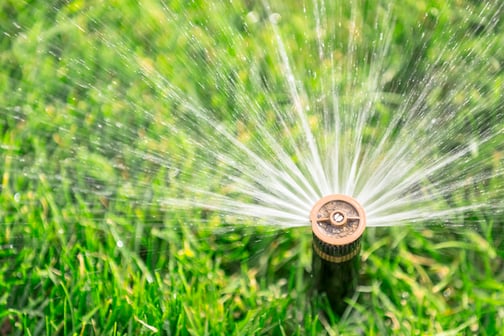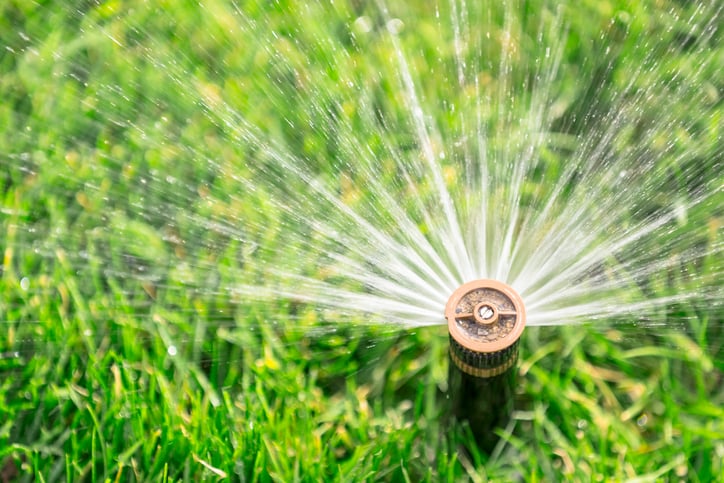In the midst of the harsh summer heat, it’s natural for you to want to water your lawns more than you typically do. Maybe even every day, in some cases. Lawn watering is a critical part of lawn care, but it’s easier to overwater (and under-water) your lawn than you think.
So, how often should lawns be watered in summer? Let’s find out.
What Happens To Over-Watered Lawns?
You can give your grass too much of a good thing. In general, it can’t use all of that water. Here’s why.
The soil underneath your lawn is composed of sand, silt, and clay particles — as well as porous spaces. When it rains, water fills those porous spaces by pushing out the air. Daily watering keeps those pores filled with water instead of oxygen, which is vital to plant growth. Without oxygen, the roots of your grass will suffocate and die. This leaves your grass with a very shallow root system.
If your lawn has a shallow root system, you’re opening yourself up to several potential problems, including making your lawn more susceptible to disease and insect damage.

Other problems that can develop from overwatering include:
- Thatch: This occurs when excess moisture in your lawn makes it difficult for dead plant material to be broken down.
- Weeds: Overwatering your lawn can create the perfect conditions for certain types of weeds to grow, such as crabgrass and nutsedge.
- Fungus: Excess moisture in your lawn can also make it easier for the fungus to grow.
But you also need to make sure that you don’t under-water your lawn.
What Happens To Under-Watered Lawns?
Signs of an under-watered lawn include the presence of the heat and stress fungus called ascochyta leaf blight, the yellowing of turf, and footprints that remain visible for a few minutes after a lawn has been walked across.
How Much Water For A Healthy Lawn?
Your grass needs up to 1½ inches of water per week in the summer, but you don’t have to do it all at once. You can spread waterings out in two sessions. This will help to further protect your lawn against drought.
There are a few ways you can tell if you’ve given your lawn the right amount of water.
- Check your soil every 15 minutes during your first watering to see how long it takes to get soaked. Then take a shovel or a screwdriver to get a measurement. When you’ve determined the water has gone six inches deep, note the time. That’s how long it should take in the future.

- If you have a sprinkler system, find what type of sprinkler head you’re using and determine its flow rate. If you multiply the square footage of your lawn by 0.62 gallons (which equals an inch of water per square foot) and divide that figure by the flow rate, you’ll find out how many minutes to run your sprinkler.
- Place (clean) empty tuna cans around the lawn and measure how long it takes for the sprinkler to fill each can with an inch of water. The sprinkler coverage will vary, so use the average time it takes to fill the cans.
One other thing you can try is the 20-minute method. Typically, it takes 20 minutes, 3 times per week to get an inch of water on your lawn. And 30 minutes, 3 times per week, will get 1½ inches down and reach even deep root systems.
But keep this in mind: During extreme heat, you will need to water more, due to evaporation and heat stress on the grass. That’s why you should try watering your lawn early in the morning.
Lush Lawn Can Help
If you’re having trouble determining the proper amount of water give us a call. A Lush Lawn specialist will help you do the math and talk about a weekly watering schedule that’s right for you.
At Lush Lawn, we offer a Water Maximizer lawn treatment that is an organic solution to help loosen the soil and increase water penetration. It allows for a small amount of water to have a bigger impact. This treatment, with proper watering, will keep your lawn healthier throughout drought conditions, and help retain the color of your lawn.
Never ask “How often should lawns be watered in the summer?” ever again. Save some money and your lawn this summer by giving us a call today to learn more about all of our lawn care services, including our fertilization schedule which treats various kinds of weeds that invade Southeast Michigan lawns.
